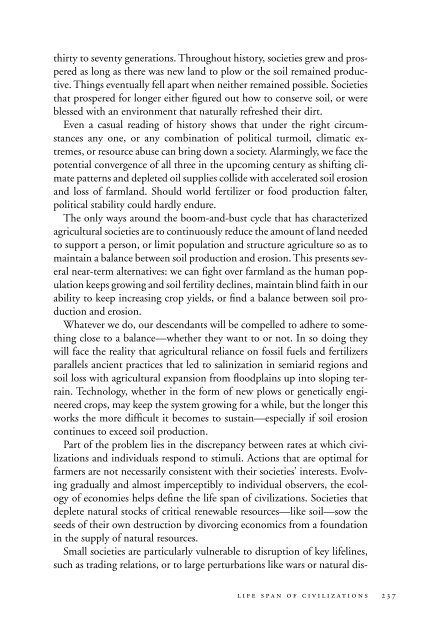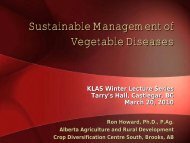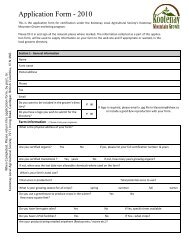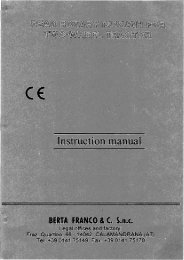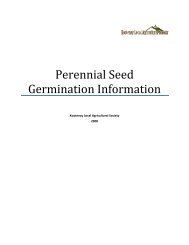Dirt: The Erosion of Civilizations - Kootenay Local Agricultural Society
Dirt: The Erosion of Civilizations - Kootenay Local Agricultural Society
Dirt: The Erosion of Civilizations - Kootenay Local Agricultural Society
You also want an ePaper? Increase the reach of your titles
YUMPU automatically turns print PDFs into web optimized ePapers that Google loves.
thirty to seventy generations. Throughout history, societies grew and prospered<br />
as long as there was new land to plow or the soil remained productive.<br />
Things eventually fell apart when neither remained possible. Societies<br />
that prospered for longer either figured out how to conserve soil, or were<br />
blessed with an environment that naturally refreshed their dirt.<br />
Even a casual reading <strong>of</strong> history shows that under the right circumstances<br />
any one, or any combination <strong>of</strong> political turmoil, climatic extremes,<br />
or resource abuse can bring down a society. Alarmingly, we face the<br />
potential convergence <strong>of</strong> all three in the upcoming century as shifting climate<br />
patterns and depleted oil supplies collide with accelerated soil erosion<br />
and loss <strong>of</strong> farmland. Should world fertilizer or food production falter,<br />
political stability could hardly endure.<br />
<strong>The</strong> only ways around the boom-and-bust cycle that has characterized<br />
agricultural societies are to continuously reduce the amount <strong>of</strong> land needed<br />
to support a person, or limit population and structure agriculture so as to<br />
maintain a balance between soil production and erosion. This presents several<br />
near-term alternatives: we can fight over farmland as the human population<br />
keeps growing and soil fertility declines, maintain blind faith in our<br />
ability to keep increasing crop yields, or find a balance between soil production<br />
and erosion.<br />
Whatever we do, our descendants will be compelled to adhere to something<br />
close to a balance—whether they want to or not. In so doing they<br />
will face the reality that agricultural reliance on fossil fuels and fertilizers<br />
parallels ancient practices that led to salinization in semiarid regions and<br />
soil loss with agricultural expansion from floodplains up into sloping terrain.<br />
Technology, whether in the form <strong>of</strong> new plows or genetically engineered<br />
crops, may keep the system growing for a while, but the longer this<br />
works the more difficult it becomes to sustain—especially if soil erosion<br />
continues to exceed soil production.<br />
Part <strong>of</strong> the problem lies in the discrepancy between rates at which civilizations<br />
and individuals respond to stimuli. Actions that are optimal for<br />
farmers are not necessarily consistent with their societies’ interests. Evolving<br />
gradually and almost imperceptibly to individual observers, the ecology<br />
<strong>of</strong> economies helps define the life span <strong>of</strong> civilizations. Societies that<br />
deplete natural stocks <strong>of</strong> critical renewable resources—like soil—sow the<br />
seeds <strong>of</strong> their own destruction by divorcing economics from a foundation<br />
in the supply <strong>of</strong> natural resources.<br />
Small societies are particularly vulnerable to disruption <strong>of</strong> key lifelines,<br />
such as trading relations, or to large perturbations like wars or natural dis-<br />
life span <strong>of</strong> civilizations 237


